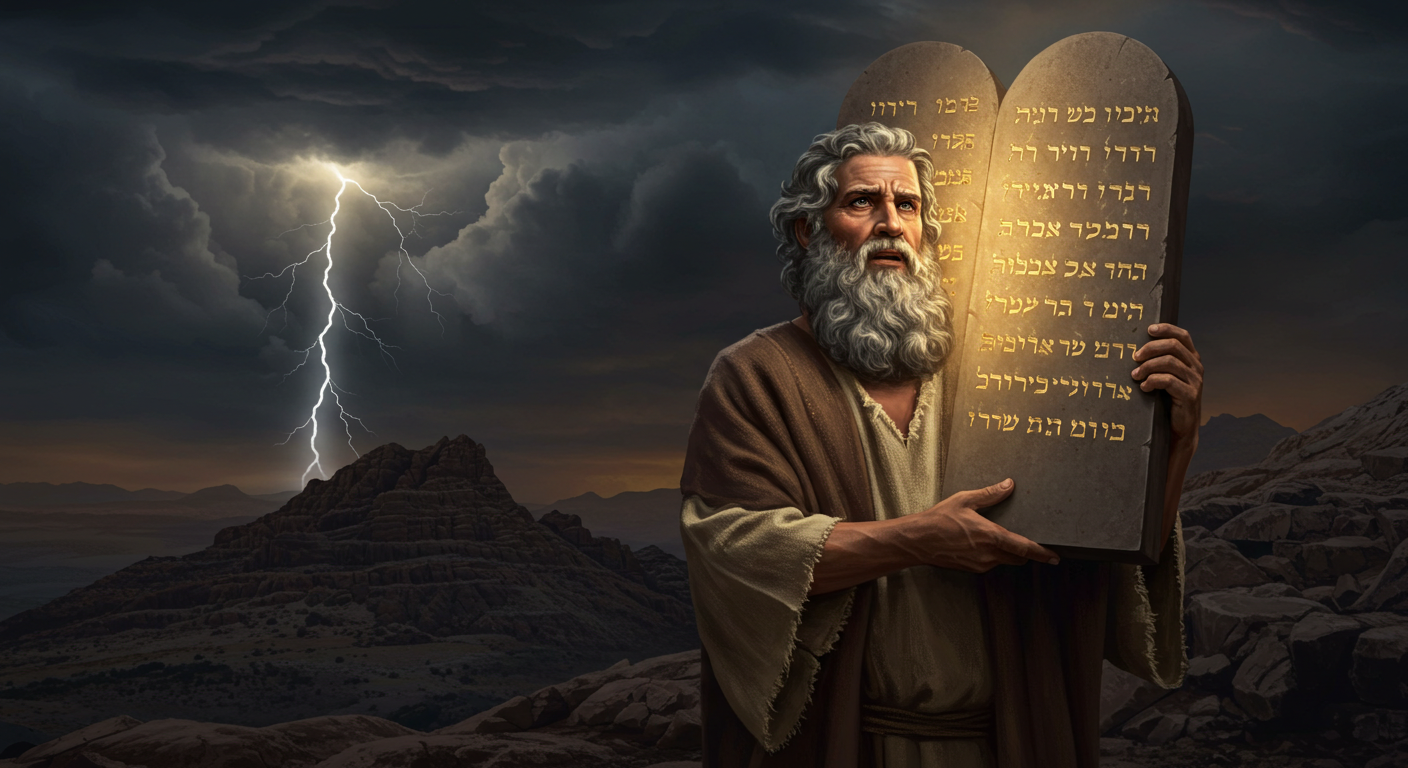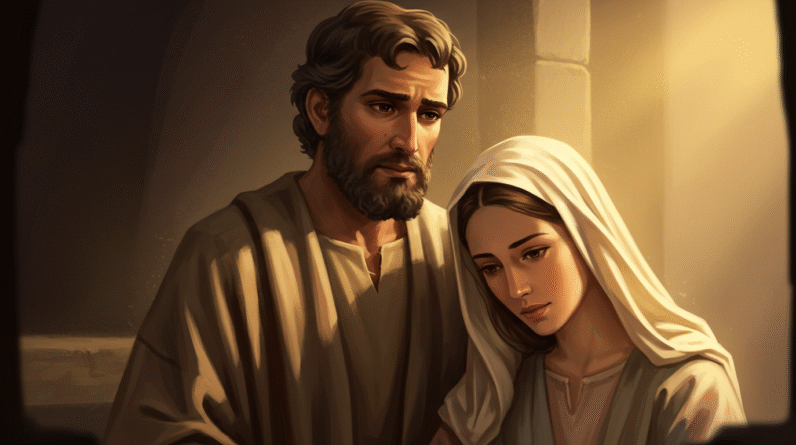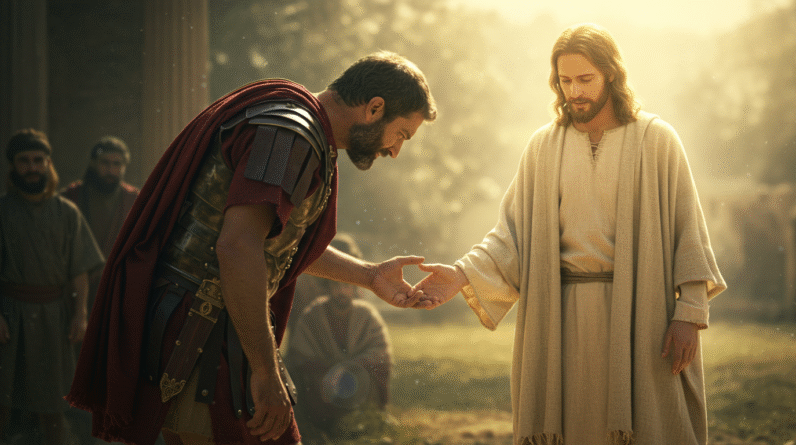Moses At Sinai: Obedience In Receiving God’s Commandments
When you think of Mount Sinai, your mind likely flashes to iconic scenes painted in cinema, where Moses, a figure of humility and reverence, ascends the mountain to receive the divine laws etched on stone tablets. This isn’t just a simple tale of a man climbing a mountain; it’s a narrative rich with obedience, an unwavering trust in a greater plan that shaped the course of a nation’s history. So, let’s step back in time and traverse the rocky paths with Moses. Explore the contours of what Moses’ obedience entailed and how his actions at Mount Sinai rippled through generations.
The Prelude to Sinai: Moses’ Call and Purpose
Before Moses’ fateful journey to Sinai, he wasn’t a foreigner to God’s extraordinary interventions. Born into a time of turmoil, Moses’ life was a series of divine orchestrations. Saved as a baby from the Pharaoh’s decree of death, raised in Egypt’s splendor, and later exiled to Midian, Moses’ life seemed like a patchwork of chance encounters until you see God’s hand weaving through it all.
Moses’ call came unexpectedly in the form of a burning bush—a flame that consumed without destruction, much like the divine presence itself. Here, Moses received his charge: to confront Pharaoh, to lead the Israelites out of Egypt, and to shepherd them into freedom. His relationship with God began with hesitancy but grew into an unparalleled trust, setting the stage for his ultimate act of submission on Mount Sinai. You can imagine the weight of such a task and the faith required to embark on it.
Journey to Sinai: Leading with Faith
The Exodus was more than a physical departure from Egypt; it was a transformational journey for the Israelites from bondage into covenant community. As Moses guided them through deserts fraught with challenges, his faith never faltered. Instead, it became a beacon through the long nights and unrelenting trials that defined their passage into the unknown.
Each step closer to Sinai was steeped in an ever-deepening relationship between Moses and God. By the time they reached Sinai, the stage was set for an encounter that would forever define their identity. Moses’ obedience was a conduit through which God’s presence and law would flow into the lives of the Israelites, shaping their identity as a chosen nation.
The Moment at Sinai: A Sacred Encounter
Imagine the towering cliffs of Mount Sinai looming against the desert sky, the air tense with anticipation. As Moses ascends alone, he carries the collective hopes and fears of his people. In that sacred space, God’s voice filled the air, offering Moses the Ten Commandments—a divine charter that would guide the hearts and lives of God’s people.
This wasn’t just a set of rules etched into stone; it was a covenant, a shared understanding between God and the Israelites. Moses’ obedience in receiving and relaying these commandments was pivotal. His submission and presence on the mountain established a bridge between the divine and mundane, showing that obedience to God wasn’t just about following commands but forming a relationship rooted in faith and trust.
Moses’ Obedience: An Act of Faithfulness
Consider the depth of Moses’ obedience. He wasn’t simply following orders but was engaged in a profound act of faithfulness. His return to the mountain, even when faced with the uncertainty of a fractious people below, highlights a steadfast loyalty to God’s will. In times of doubt and rebellion, Moses repeatedly demonstrated that true leadership lies in unwavering devotion to a higher purpose.
Moses’ obedience was not passive; it was active and engaged. He interceded for the Israelites when they faltered and pleaded with God to remember His covenant when wrath seemed imminent. Exodus 32:11 exemplifies this beautifully: “But Moses sought the favor of the Lord his God…”
These actions show that Moses’ obedience was an expression of a profound relationship with God, one built on trust and communion. You could see how his submission wasn’t mere acquiescence but a dialogue with the divine.
Consequences of Obedience: Shaping a Nation’s Destiny
Moses’ obedience had far-reaching consequences. The commandments received at Sinai weren’t just laws; they were the framework for a new society. These guidelines forged the moral and ethical backbone of Israelite culture, giving them identity and purpose as a nation called to be holy.
Through his unwavering obedience, Moses shaped Israel’s destiny. Each commandment etched onto tablets pointed to a life lived in harmony with God and others. His dedication to God’s will ensured that the Israelites had a foundation that could withstand the tests of time.
The Human Element: Moses’ Struggles and Perseverance
While Moses is often depicted as a paragon of virtue, it’s crucial to acknowledge his humanity. His journey was fraught with struggles. At times, he was weary, overwhelmed by the sheer weight of his responsibility. Yet, through it all, Moses persevered.
His obedience was a choice—a conscious decision to put trust over doubt, faith over fear. Instances like Moses striking the rock at Horeb instead of speaking to it, as God commanded, illustrate that even the most faithful aren’t immune to lapses in judgment. Numbers 20:11-12 remind us that obedience, while challenging, is a continual journey of relinquishing control.

Lessons from Sinai: Obedience in Today’s Context
What can you, as a modern reader, learn from Moses’ obedience at Sinai? At its core, this story is about cultivating a relationship rooted in trust. Life’s paths may take unexpected turns, filled with challenges that test your faith. Yet, through Moses’ narrative, the message is clear: steadfastness in the face of uncertainty can forge paths of profound impact.
Moses’ journey reveals that obedience and personal growth aren’t isolated experiences. They’re intertwined with community and purpose. His leadership at Sinai reminds us that individual acts of faith contribute to the collective identity and destiny of communities.
Moses’ Legacy: Eternal Influence Through Obedience
Moses’ legacy of obedience resonates through history, leaving a blueprint for future generations. His example transcends time, showing that true leadership isn’t about exerting power but yielding to a higher calling. The commandments received at Sinai continue to shape ethical and spiritual discourse, underscoring the enduring influence of Moses’ obedience.
This legacy isn’t just history; it’s a call to action. You’re invited to embrace the complexities of obedience in your own life—to listen for the voice that calls, guides, and shapes your journey. Like Moses, your path may seem daunting, but it holds the potential to transform lives.
Drawing Inspiration: Embracing Your Journey
Reflect on how Moses’ journey speaks to your own experiences. In your moments of doubt or uncertainty, you can turn to the wisdom in the Sinai narrative, recognizing that obedience is both a challenge and a gift. Embrace the lessons learned from Moses and find strength in your submission to a higher purpose.
You aren’t alone in this journey. The narrative of Moses and Sinai encourages a shared experience of faith and community. As you navigate your own path, remember that your story contributes to a larger tapestry woven throughout history.
Conclusion: The Power of Moses’ Obedience
Moses’ ascent of Mount Sinai isn’t just a historical event; it’s a powerful testament to the strength found in obedience. Through his unwavering submission, we see the richness of a life lived under divine purpose. Whether you view these ancient stories through a lens of faith, philosophy, or curiosity, Moses’ obedience remains a beacon guiding the way.
As you contemplate this narrative, consider how the principles of Sinai might inform your journey. Reflect on the lessons of trust, leadership, and community that emerge when you embrace obedience as a path of transformation.
Explore More
For further reading and encouragement, check out these posts:
👉 7 Bible Verses About Faith in Hard Times
👉 Job’s Faith: What We Can Learn From His Trials
👉 How To Trust God When Everything Falls Apart
👉 Why God Allows Suffering – A Biblical Perspective
👉 Faith Over Fear: How To Stand Strong In Uncertain Seasons
👉 How To Encourage Someone Struggling With Their Faith
👉 5 Prayers for Strength When You’re Feeling Weak

📘 Jesus and the Woman Caught in Adultery – Grace and Mercy Over Judgement
A powerful retelling of John 8:1-11. This book brings to life the depth of forgiveness, mercy, and God’s unwavering love.
👉 Check it now on Amazon
As a ClickBank Affiliate, I earn from qualifying purchases.
Acknowledgment: All Bible verses referenced in this article were accessed via Bible Gateway (or Bible Hub).
“Want to explore more? Check out our latest post on Why Jesus? and discover the life-changing truth of the Gospel!”








